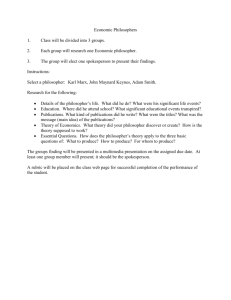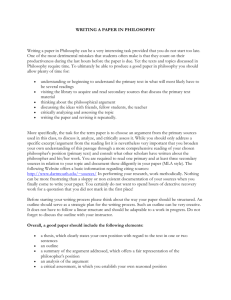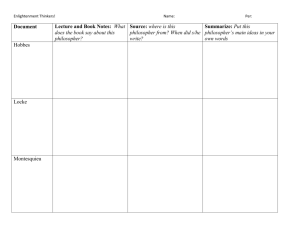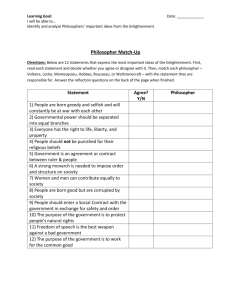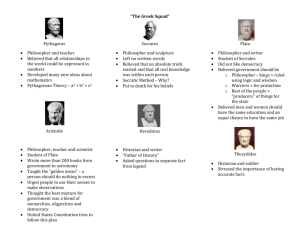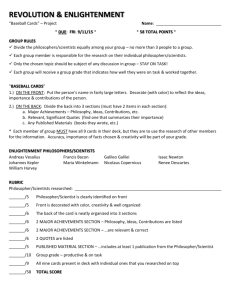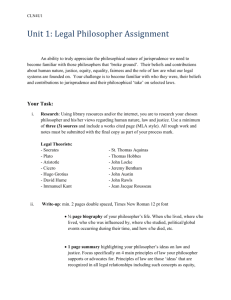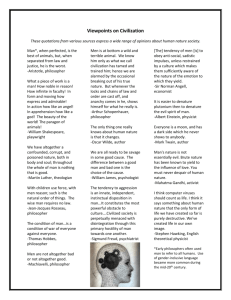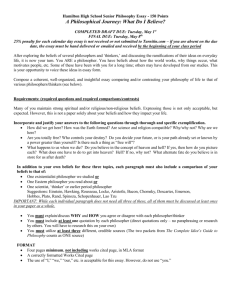Notes on Hume`s And Enquiry Concerning Human
advertisement
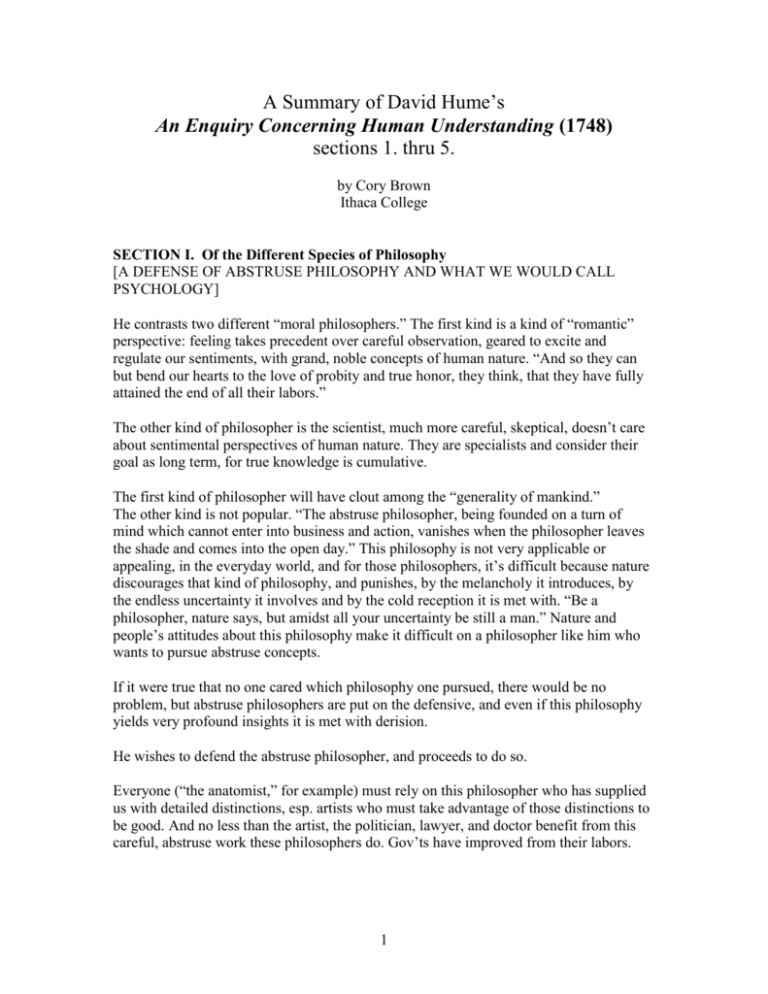
A Summary of David Hume’s An Enquiry Concerning Human Understanding (1748) sections 1. thru 5. by Cory Brown Ithaca College SECTION I. Of the Different Species of Philosophy [A DEFENSE OF ABSTRUSE PHILOSOPHY AND WHAT WE WOULD CALL PSYCHOLOGY] He contrasts two different “moral philosophers.” The first kind is a kind of “romantic” perspective: feeling takes precedent over careful observation, geared to excite and regulate our sentiments, with grand, noble concepts of human nature. “And so they can but bend our hearts to the love of probity and true honor, they think, that they have fully attained the end of all their labors.” The other kind of philosopher is the scientist, much more careful, skeptical, doesn’t care about sentimental perspectives of human nature. They are specialists and consider their goal as long term, for true knowledge is cumulative. The first kind of philosopher will have clout among the “generality of mankind.” The other kind is not popular. “The abstruse philosopher, being founded on a turn of mind which cannot enter into business and action, vanishes when the philosopher leaves the shade and comes into the open day.” This philosophy is not very applicable or appealing, in the everyday world, and for those philosophers, it’s difficult because nature discourages that kind of philosophy, and punishes, by the melancholy it introduces, by the endless uncertainty it involves and by the cold reception it is met with. “Be a philosopher, nature says, but amidst all your uncertainty be still a man.” Nature and people’s attitudes about this philosophy make it difficult on a philosopher like him who wants to pursue abstruse concepts. If it were true that no one cared which philosophy one pursued, there would be no problem, but abstruse philosophers are put on the defensive, and even if this philosophy yields very profound insights it is met with derision. He wishes to defend the abstruse philosopher, and proceeds to do so. Everyone (“the anatomist,” for example) must rely on this philosopher who has supplied us with detailed distinctions, esp. artists who must take advantage of those distinctions to be good. And no less than the artist, the politician, lawyer, and doctor benefit from this careful, abstruse work these philosophers do. Gov’ts have improved from their labors. 1 So these philosophers are gatekeepers for accuracy in all disciplines. H. is taking up a Baconian project here, claiming to be striving to better our conditions with scientific thinking. Furthermore, there can be had a joy from these metaphysical labors: “…to bring light to obscurity” must bring joy to that philosopher. To the objection that these phil’s are often wrong, he answers that even so there is always hope that future philosophers can sharpen that understanding. It is always wiser to follow the sc. method no matter how fallible it is, than to put yr hopes in a method with no history of attaining certainty. To overcome superstition, we must inquire seriously into the very nature of human understanding. We must turn our inquiry on its own source and examine our way of thinking. He’s answering here to the objection that the source of these observations is suspect because it comes from the human mind which is subject to superstition or human vanity [Bacon’s “idols”]. To explain what these objectors are doing he uses a metaphor: these objectors are chased from open country [they had no other objections to science] and fly into the forest and lie in wait to break in on every unguarded avenue of the mind. That is, the anti-scientists resort to epistemological objections that the workings of the mind itself are too subject to fallacious thinking. His response is an argument for psychology, that there’s a truth and falsehood to every observation, which are not beyond human understanding. The rejection of false truths is just as achievable in psychology as it is in cosmology. To get at the fundamentals of psychology is a worthy endeavor and will yield truths, in spite of it being difficult. [This defense I find ironic in light of his own later radical skepticism.] SECTION II. Of the origin of ideas [TWO KINDS OF “PERCEPTIONS” AND THOSE COMING FROM SENSES ARE STRONGER] He opens with a defense of empiricism, and an explanation of its fundamental principles. There are two kinds of perceptions. 1. thoughts and ideas 2. impressions Sense impressions are stronger than any other kinds of perceptions. The mind is powerful, we can imagine wild and imaginative things; and we might think that we have a wild ability to create thoughts and ideas, strong perceptions. But in reality, on closer examination, those perceptions of the imagination that we think we have created from nothing are really combinations of impressions we have already perceived. For ex: the idea of God, meaning an infinitely intelligent and wise being, we might think comes from something beyond our own mind because of its strong effect on us. But in 2 reality it merely “arises from reflecting on the operations of our own mind.” In fact, we have no idea that does not come from sensation. One exception has to do with gradation of colors—we might have an idea of a color we haven’t seen, but what we’re doing is filling in the blank, so to speak, of our impressions of two related colors. Impressions are stronger than ideas: “All ideas, esp. abstract ones, are naturally feint and obscure; the mind has but a slender hold on them –they are apt to be confounded with other resembling ideas—on the contrary, all impressions are strong and vivid.” So to clear disputes about ideas, we must determine what impressions they come from. “When we entertain therefore any suspicion that a philosophical term is employed, we need but inquire from what impression that supposed idea derived—by bringing ideas in so clear a light we may reasonably hope to remove all dispute which may arise concerning their nature and reality.” SECTION III. Of the Association of Ideas [HOW IDEAS ARE ASSOCIATED] It’s useful to categorize ways ideas are associated. This may be obvious that ideas are associated, but he doesn’t know any philosopher who’s enumerated all the principles of association. There are 3 of them: 1. resemblance 2. contiguity in time or place 3. cause or effect These constitute the 3 different ways one idea can associate itself with another. One may think a 4th one is contrast, but contrast is merely a negative form of resemblance. SECTION IV. Skeptical Doubts Concerning the Operations of Understanding Part 1. [TWO TYPES OF HUMAN REASONING AND ONLY ONE OF THEM CONCERNS HIS INQUIRY INTO WHAT WE CAN KNOW FOR CERTAIN] All the objects of human reason or inquiry may naturally be divided into two kinds: 1. relations of ideas or 2. matters of fact. 1. Relations of Ideas: These are found in the sciences of geometry, algebra, and arithmetic. In short, they are every affirmation which is either intuitively or demonstrably certain. “That the square of the hypotenuse is equal to the squares of the two sides [Pythagorean theorem] is a 3 proposition which expresses a relation between these figures.” These kinds of propositions are discoverable by the mere operation of thought, without dependence on what is anywhere existent in the universe.” Hume is not concerned with relations of ideas, for they are merely tautologies, that is, structures of proofs that cannot be anything but true, for we have set them up to fulfill that requirement for themselves. 2. Matters of fact [We might for our own clarity call these “Matters of Fact,” with quotes, to signify that we merely call them facts, when they are, in fact, not.]: In contrast to truths that arise from Relations of Ideas, Matters of Fact can always in our imagination be contradicted. Contrary to every “matter of fact” is still always possible. For example, that the sun will not rise tomorrow is no more a contradiction than that it will rise. It’s therefore worthy to inquire what the nature of this evidence is that assures us that anything is a matter of fact. All reasonings concerning matters of fact are founded on the relation of cause and effect on sense impressions. If we are to satisfy ourselves concerning the nature of that evidence by which we assume matters of fact, then we must inquire how we arrive at the knowledge of cause and effect. The knowledge of that cause and effect is not a priori; it comes entirely from the senses. If we come into contact with some new object, we will not be able to discover any of its causes or effects. We must admit that when we look at our own experience, when we came into contact with new objects, we were not able to automatically know what caused it or what it may cause. The same is true for events. This is true even though we think it is not. We think that we can infer simply from witnessing one billiard ball hitting another what would happen. But we could not infer this a priori. The only reason we think we would know what would happen is that we have witnessed the result before, and that conclusion has been supported by repeated observations. Custom compels us to be firm in our belief concerning the existence of things and causes and effects of things. “And as the first imagination or invention of a particular effect, in all natural operations, is arbitrary, where we consult not experience; so must we also esteem the supposed tie or connexion between the cause and effect which binds them together and renders it impossible that any other effect could result from the operation of that cause.” If we were to see one billiard ball hitting another for the first time, there’s no reason why we would not think that the second billiard ball would, say, not move, or fly straight up. “In a word, then, every effect is a distinct event from its cause. It could not, therefore, be discovered in the cause, and the first invention or conception of it a priori must be entirely arbitrary. Hence the reason why no philosopher has ever pretended to assign an ultimate cause of any natural operation, or to show distinct the action of that power which produces any single effect in the universe.” Even though that project is one of the utmost efforts of human reason, no philosopher has succeeded in doing so, because these ultimate causes are “totally shut up from human curiosity and inquiry.” 4 Geometry [and what we call physics] is not excluded from this principle. “Every part of mixed mathematics proceeds upon the supposition that certain laws are established by nature in her operations, and abstract reasonings are employed either to assist experience in the discovery of these laws or to determine their influence in particular instances where it depends upon any precise degree of distance and quantity. Thus it is a law of motion discovered by experience that [following is one of Newton’s laws of motion] the movement or force of any body in motion is in a compound ratio of proportion of its solid contents and its velocity, and consequently that a small force may remove the greatest obstacle or raise the greatest weight if by any contrivance or machinery we can increase the velocity of that force so as to make it an overmatch for its antagonist. Geometry assists us in the application of this law by giving the just dimensions of all the parts and figures which can enter into any species of machines. But still the discovery of the law itself is owing merely to experience, and all the abstract reasonings in the world could never lead us one step toward the knowledge of it.” “A man must be very sagacious who could discover by reasoning that crystal is the effect of heat and ice of cold, without being preciously acquainted with the operation of these qualities.” When we reason a priori and consider merely any object or cause which appears to the mind, independent of all operation, it never could suggest to us the notion of any distinct object such as its effect, much less show us the inseparable and inviolable connection between them. PART 2. [THE LOGIC OF THESE ASSUMPTIONS WE MAKE IS CIRCULAR— CAUSE-EFFECT ASSUMPTIONS ARE BASED ON EXPERIENCE ITSELF] But we haven’t got an answer, he says, to his original question, which is what is the nature of all reasoning concerning matters of fact. His answer: experience itself. What is the foundation of all conclusions from experience? Experience itself. Thus there is a circular reasoning to empirical epistemology. Even after we have experience of the operations of cause and effect, our conclusions of that experience are not founded on reasoning. Example: we assume bread’s nutritional value only because we have associated qualities of a loaf of bread with its results—we feel its nutritional effects. Those associations are repeated again and again, which reinforces our assumptions about bread’s nutritional effect, which we think is a matter of fact. We think a fact is fact because we assume that fact is caused by a previous fact. We make that assumption about cause and effect only because we commonly witness some things or events appearing to be caused by other things or events. But there’s no logical reason to assume that an event or thing is caused by another event or thing; all we have to go on is experience itself. 5 This negative argument must in time become altogether convincing. All reasoning, he says, can be divided into two kinds: demonstrative reasoning [those relations of ideas found in geometry & math, etc., forming tautological truths, e.g., a triangle has three sides] and moral reasoning, which concerns matters of fact. And, he says, “That there are no demonstrative arguments in this case seems evident; since it implies no contradiction that the course of nature may change [e.g., that tomorrow the sun will rise in the West] and that things may be different than what they normally are. May we not conceive that a body falling from the clouds, and which in all other respects resembles snow has yet to taste of salt or feel of fire? Whatever is intelligible and can be distinctly conceived implies no contradiction and can be proved false. Therefore, if we are engaged by arguments to put trust in our past experience, these arguments must be probable only according to the division above mentioned.” Thus, the principle by which we assume that matters of fact are indeed matters of fact is logically circular. He confesses that this might appear arrogant of him to conclude that because an argument can’t be refuted now then no argument exists to refute it. But, he says, in this case, “there is no argument that can convince a person that an effect is a result of cause. That understanding is only to be got by experience.” SECTION V. Skeptical Solution of These Doubts PART 1. [UNPOPULAR ROLE OF EMPIRICISM AMONG PEOPLE, BUT WE SHOULDN’T FEAR IT BECAUSE IT IS NOT GOING TO CHANGE OUR NATURAL WAY OF PERCEIVING THE WORLD] Philosophy tends to support the status quo, and most philosophical thinking merely supports what we want it to. Empiricism isn’t popular because it doesn’t flatter us. It opposes many of our vices and follies, “and so makes many enemies of it, who stigmatize it as libertine, profane, and irreligious.” But we shouldn’t fear empiricism, for “nature always maintains her rights.” It’s not going to affect our natural way we perceive the world. These psychological discoveries will never “put in danger the reasonings on which all knowledge depends.” We’re stuck with these assumptions we make though we don’t make them with reason. Our way of perceiving the world will not change. But it’s worth inquiring into the principle that makes us think according to these unreasonable assumptions about cause and effect. He concludes that these assumptions we make are necessary to our survival [more on this in Part 2 of this section]. He reiterates that something is a matter of fact only because we have either experienced that matter of fact or have been told by another that it is a matter of fact. 6 In conclusion, though this is simple, it is nonetheless remote from common theories of philosophy: “All beliefs of matter of fact or real existence is derived merely from some object present to the memory or senses and the customary conjunction between that and some other object. Having found in many instances that any two kinds of objects, flame and heat, snow and cold, have always been conjoined together…the mind is carried by custom to expect heat or snow and to believe that such a quality does exist and will discover itself upon a near approach.” Part II. [of section V.] [A DESCRIPTION OF THE PSYCHOLOGY OF OUR ERRONEOUS ASSUMPTIONS ABOUT MATTERS OF FACT: THOSE ERRONEOUS BELIEFS ARE CREATED AND REINFORCED BY FEELINGS ASSOCIATED WITH THEM. AND THIS “SYSTEM” IS A SURVIVAL MECHANISM—[HERE WE HAVE A PRE-DARWINIAN ANALYSIS OF ADAPTIVE BEHAVIOR (THE ORIGIN OF SPECIES WAS PUBLISHED 100 YEARS LATER)] We believe cause-effect relationships only because we have over a long period of time witnessed (experienced) events or things being caused by previous events or things, and we have simply developed a habit of believing cause-effect relationships. Now, this habit is created and supported by an attendant feeling when we witness that cause or matter of fact. That feeling when we witness this fact or event confirms our prejudice that that thing or event exists and/or is caused by what we think it is caused by. For example, “upon the appearance of a picture of an absent friend, our idea of him is enlivened by the resemblance and every passion which that idea occasions, whether of joy or sorrow, is reinforced. In producing this effect, there can occur both a relation and an impression.” Another example: “Superstitious people are fond of the relics of saints for the same reason they seek after types or images, in order to enliven their devotion and give them a more intimate and strong conception of their exemplary lives which they desire to imitate.” This habit we have of making connections between events and their assumed causes helps us survive. “When a sword is leveled at my breast, does not the idea of wound and pain strike me more strongly than when a glass of wine is presented to me, even though by accident this idea should occur after the appearance of the latter object.” “Custom is that principle by which the correspondence has been affected, so necessary to the subsistence of our species and the regulation of our conduct in every circumstance and occurrence in human life. … If this didn’t occur we wouldn’t be able to adjust means to ends and employ our natural powers either of the producing of good or avoiding of evil. 7
